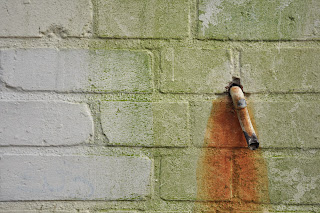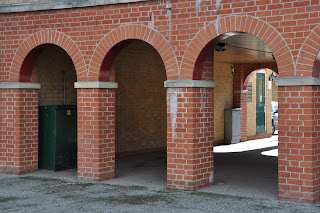One of these images should have a very high dynamic range and one should have a low range and appear quite flat.
This image has a high contrast with the reflective surface of the water and the white sky and dark shadow areas. I shot at an aperture of f/7.1
The white sky reading was 1/1600s. The deep shadow areas of the boat gave me a reading of 1/50s. There is about 5 stops in the scenic dynamic range of this image.
I avoided bright whites in this image to produce a more low range image. I shot using an aperture of 1/I got a reading of 1/25s for the shadow areas under the bench and 1/250s for the bushes in the background. There are 3 stops in the scene dynamic range.
In this image I shot using an aperture of f/8. The bolt area gave me a reading of 1/60s and the yellow sign 1/500s which is about 3 stops.
This is a pretty low range composition giving a reading of 1/60s for the pipe area and 1/250 for the off white walls. This is 2 stops.
This image provides a bit more contrast. Shooting at f/11 I got a reading of 1/8s for the deep shadow areas under the arch and 1/320s for where the sun is shining in the right hand side of the image. This equates to 5 stops which would suggest this is a more contrasty image.
From doing this exercise I have discovered that shots I thought were not so 'flat' are relatively flat. I seem to conjure up foggy landscapes when I think of low range. Scenes with colours that do not vary in brightness equally provide a low range as in the image of the pipe above and the building site hoarding.
I think I also thought that more contrasty images would use the full dynamic range of the camera but the first image in this series proves that this is not the case. I did under-expose the shot to retain all the detail in the sky. I wonder if the dynamic range would have been affected if I let the highlights blow. When I next shoot in this situation I will try this out.





No comments:
Post a Comment